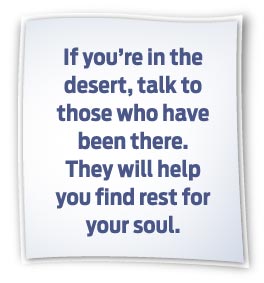Andy Nash
SEVERAL YEARS AGO, WHEN I FIRST STARTED TEACHING AT SOUTHERN Adventist University (after having been a student here a decade earlier), I’d blow out of town as fast as possible. I’d finish my teaching and office tasks, then literally race out of Collegedale to our home 15 minutes away, sometimes with tears in my eyes, always with angst in my soul. Being on a college campus wasn’t the issue; I’ve always enjoyed college students, both at Southern and at Union College previously. The issue was, suddenly, being in such a heavily Adventist setting.
As have many others (whether privately or publicly), I had unexpectedly entered a desert of theological grappling that threatened to dry up my confidence in many Adventist teachings, including the place of the Sabbath to new covenant believers. Texts such as Colossians 2:16, 17 and Galatians 4:9-11 particularly challenged me.
 It wasn’t that I was losing faith in Christ. Actually, I was more focused than ever on Christ’s once-for-all sacrifice as I studied Scripture deep into the night. The question I pondered, to use terms from the Colossians passage, was: If Christ is the substance, do we still need the shadows? For that matter, do the shadows distract us from the glory of the cross?
It wasn’t that I was losing faith in Christ. Actually, I was more focused than ever on Christ’s once-for-all sacrifice as I studied Scripture deep into the night. The question I pondered, to use terms from the Colossians passage, was: If Christ is the substance, do we still need the shadows? For that matter, do the shadows distract us from the glory of the cross?
Added to the theological wrestling were concerns I’ve always felt, even when working at the Adventist Review, about the heavy focus many Adventists seem to place on the trivial at the expense of the important—majoring in minors and minoring in majors.
Across campus at the Village Market I’d see a man who looked like James White standing outside warning whoever would listen—in this case, a polite Asian student who didn’t seem to know how to get away—about the end of the world. “September 11 was only the start,” “James White” would say, his face turning crimson. “The next time it’s going to be a bombshell!” To me this represented the worst of Adventism, and it repelled me all the more.
Yet I couldn’t let it all go. I spoke often with close Adventist friends I respected, expressing my questions and struggles. I had no truer friend during this period than conservative Adventist writer and editor Clifford Goldstein. Cliff called me at least once a week, not to debate but just to see how I was doing.
Others were there for me as well. Chris Blake, author and teacher, had registered plenty of his own concerns with the Adventist Church over the years. “My approach,” he said, “is not to let the bad guys win.”
“The church has problems,” agreed my Australian friend Gary Krause, director of Adventist Mission. “But what appeals to me about the Adventist Church is its focus on wholeness.”
Once a month I had lunch with my former journalism professor, Lynn Sauls, who systematically worked through difficult questions with me—and on his own dime, bought me several pertinent books to read.
I realized I had to decide who the church was. Was it Mr. Bombshell, or was it people like Cliff, Chris, Gary, and Lynn? When I looked in general at who emerged as the leaders of the church—such wonderfully balanced people as my former boss at the Review, William Johnsson, and Southern’s respected president, Gordon Bietz—I found hope returning.
And the students themselves—I began to look into their bright eyes. Compared with the heavier expressions I saw on public university campuses, these students were absolutely the kind of people I wanted to be part of. I realized that my eyes had once been bright too.
Finally, I went deeper into my study, past the well-meaning but “easy” answers provided by some Adventist ministries. And I got my questions answered, including my questions about the Sabbath. It hadn’t been replaced by the rest of God. Rather, Sabbath rest had always coexisted with God’s rest (see Heb. 4).
I began to find rest again myself. One Sunday morning (a time we had been visiting other churches to see what was out there), my family and I drove out to the country. “What are we doing, Daddy?” said my 8-year-old daughter.
“Healing,” I said.
My wife, Cindy, sighed and nodded. We both had some healing to do.
If you’re in the desert, talk to those who have been there. They will help you find rest for your soul.
____________
Andy Nash is a journalist and lay pastor. His new book is Paper God: Stumbling Through Failure to a Deeper Faith (PACIFIC PRESS). This article was published December 16, 2010.

 It wasn’t that I was losing faith in Christ. Actually, I was more focused than ever on Christ’s once-for-all sacrifice as I studied Scripture deep into the night. The question I pondered, to use terms from the Colossians passage, was: If Christ is the substance, do we still need the shadows? For that matter, do the shadows distract us from the glory of the cross?
It wasn’t that I was losing faith in Christ. Actually, I was more focused than ever on Christ’s once-for-all sacrifice as I studied Scripture deep into the night. The question I pondered, to use terms from the Colossians passage, was: If Christ is the substance, do we still need the shadows? For that matter, do the shadows distract us from the glory of the cross?